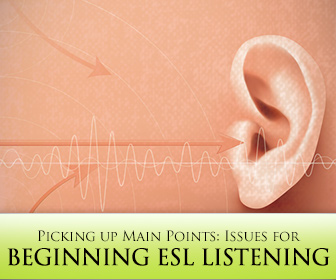Picking up Main Points: Issues for Beginning ESL Listening


ESL teachers know that possibly the most important skill for learners is social mixing and mingling conversation, but role playing in partners or repetitions often lack real life context and go stale after a while. Give your ESL students an opportunity to practice one-on-one conversation with natives or advanced speakers and liven up your class with a real party!
Invite good natured English speakers to class, to an afternoon cocktail party, a light lunch, or whatever other party is culturally appropriate. You want to have, at minimum, a ratio of one native or advanced speaker to two students if possible. Do whatever is within your means and budget! If you are in a foreign country with few speakers, invite an advanced class to come, or other teachers.
Before the party, teach the following 10 basic social skills to students and have them practice on each other. Give them a debriefing checklist with the skills before the party telling them that they are responsible to record both the responses of the natives as well as note their body language and other conversational cues. Give a certain number of points for completing each task, and award the student with the most points a prize. Save time also at the end of the party or the next class to have a gossip session about the results!

Your students probably already know greetings and the difference between formal and informal salutations. They might not have ever had a chance to practice using them in a real social setting, however. Tell them to see how many different “hellos” and “I am well” responses they can fit into their conversations! Award a point for each different one used.
Ask students to practice eliciting vocation information in a social conversation context. They can ask “What do you do?” and “Where do you work?” Give them a point for each answer they receive.
Have students practice asking if people are from around your community or from where their family originated. For each answer they receive, give them a point. They can ask, “Where are you from originally?” or “Do you live around here?”
It can be trickier getting personal with strangers! Brief them that to ask these questions about hobbies and pastimes, they might have to wait until some information is offered from another question. For example, if they had asked “What do you do?” and received an answer like “I am a waiter but I really love to write novels”, they can use that as a cue to ask about a writing hobby. Practice this skill before the party by preparing a list of short dialogues for pairs to take turns dialoguing in front of the class. Give two sentences like above and then demonstrate that they should respond something like “Oh, so you write in your free time?” Give two points for each hobby solicited as this is more challenging!
Students should wait for cues to ask about family in most cases as well. You can design another practice dialogue like in number four or teach to ask general questions, like “Do you have family in the area?” Give two points for each specific data point they can figure out via open ended questions.
Have them try to figure out how people are connected to the group. This is an important social skill and a good conversation starter. They should ask, “How did you get involved in this party?” This is a great way to solicit work, hobby, and heritage information as well! Give two points if students can figure out how your native speakers ended up at the party. If you invited an advanced group, have them try to discover why they are studying English.
Give a point for each body language note students deliver. For examples, they should focus on 1) if people look them in the eye when they speak and 2) if people laugh or smile during the conversation.
Give students a point for each appropriate response they give to elicited personal information. For example, if they manage to discover where a native’s family is from, they should respond with where they are from! Giving back is critical to dialogue.
Teach the art of polite interjections, such as “I see”, “how interesting”, and “that sounds amazing”. For each proper use, give a point.
Teach students to look for cues of when a mingling conversation should end. Cues can be “My drink is empty”, “I need to go to the bathroom”, or body language hints like they begin looking away. For every proper cue noted and responded to by walking away, give a point.
When practicing in class has become boring or just does not seem like enough, take experiential to the next level and bring the party to your students!